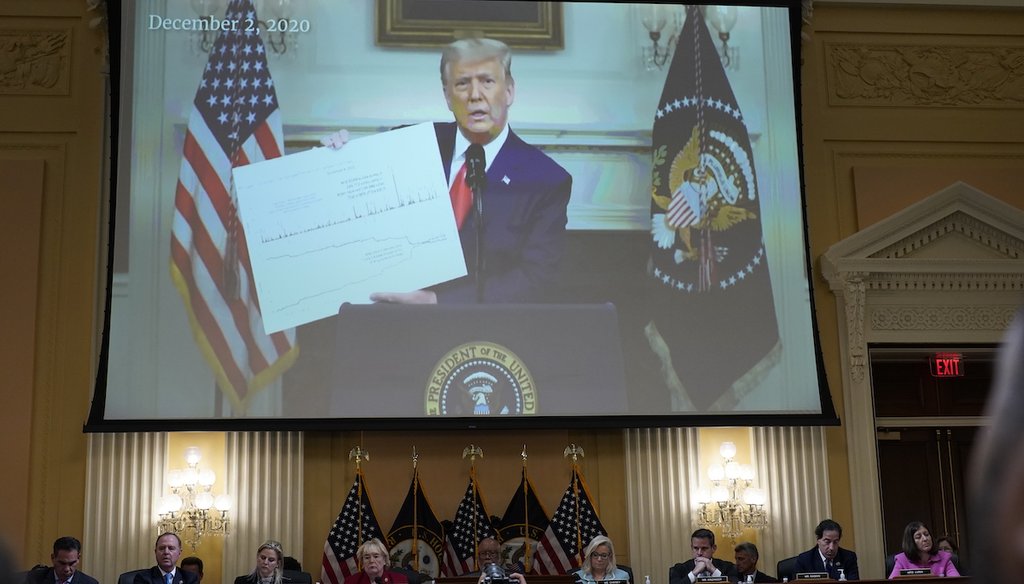Stand up for the facts!
Our only agenda is to publish the truth so you can be an informed participant in democracy.
We need your help.
I would like to contribute

A video clip of former President Donald Trump falsely describing voter fraud plays at a hearing of the House select committee investigating the Jan. 6 attack on the U.S. Capitol. (AP)
If Your Time is short
Multiple top campaign staff and Justice Department leaders told Trump he had lost and that fraud had played no role in shaping the outcome of the election.
If former President Donald Trump believed he won the 2020 election, it wasn’t because his hand-picked team told him he had. They told him precisely the opposite.
Trump repeatedly rejected advice and blunt assessments about his loss, according to numerous accounts shared during June 13 testimony before the House committee investigating the Jan. 6, 2021, breach of the U.S. Capitol.
In recorded interviews, top Trump campaign staff and Justice Department leaders described what they said on Election Day and in the months that followed. Here are some of their key statements.
Election night and just after
As returns came in, the Trump campaign knew that in-person results would come faster than the tabulations of mail-in votes. Trump wanted to declare an early victory.
Bill Stepien, Trump campaign manager:
"My recommendation was to say that votes were still being counted, it’s too early to tell, it’s too early to call the race … The president disagreed with that… He thought I was wrong, he told me so."
Stepien described briefing Trump on Nov. 5, 2020, two days after Election Day, when votes were still being counted in key states.
"We told him, the group that went over there, outlined my belief in chances for success at this point … and we pegged it at 5%, maybe 10%."
Jason Miller, Trump campaign senior adviser:
"I was saying, we should not go declare victory until we had a better sense of the numbers."
Allegations of election fraud
For months leading up to the election, Trump had warned that the only way he could lose was through fraud. After the results were in, he amplified unsubstantiated allegation after allegation that suggested his warnings were coming to fruition: Ballot dumps by the truckload; double voting; dead people voting; even elaborate digital vote switching driven by overseas deceased dictators.
Derek Lyons, counselor to Trump:
"A month and a half or so after Election Day, at that meeting, various allegations of fraud were discussed, and Eric (Herschmann, White House lawyer) and Pat (Cipollone, White House counsel) told the group, the president included, that none of those allegations had been substantiated to the point where they could be the basis for any litigation challenge to the election."
William Barr, U.S. attorney general:
"I made it clear I did not agree with the idea of saying the election was stolen and putting out this stuff which I told the president was bull----."
"When I went into (claims of fraud) and would, you know, tell him how crazy some of these allegations were, there was never an indication of interest in what the actual facts were."
Jeffrey Rosen, acting U.S. attorney general (replaced Barr after Dec. 23, 2020):
"There were instances where the president would say ‘people are telling me this’ or ‘I heard this’ or ‘I saw on television, you know, this impropriety in Atlanta’ or Pennsylvania or something. And we were in a position to say, our people have already looked at that and we know that you’re getting bad information that’s not correct."
Richard Donoghue, acting U.S. deputy attorney general:
"I said something to the effect of, sir, we've done dozens of investigations, hundreds of interviews. The major allegations are not supported by the evidence developed. We’ve looked at Georgia, Pennsylvania, Michigan, Nevada. We are doing our job. Much of the info you are getting is false… He said there's lots of fraud going on here. I told him flat-out that much of the information he's getting is false and/or just not supported by the evidence."
Staff writers Ellie Borst and Grace Abels contributed research.
Our Sources
PBS, Jan. 6 Committee hearings - Day 2, June 13, 2022




















































